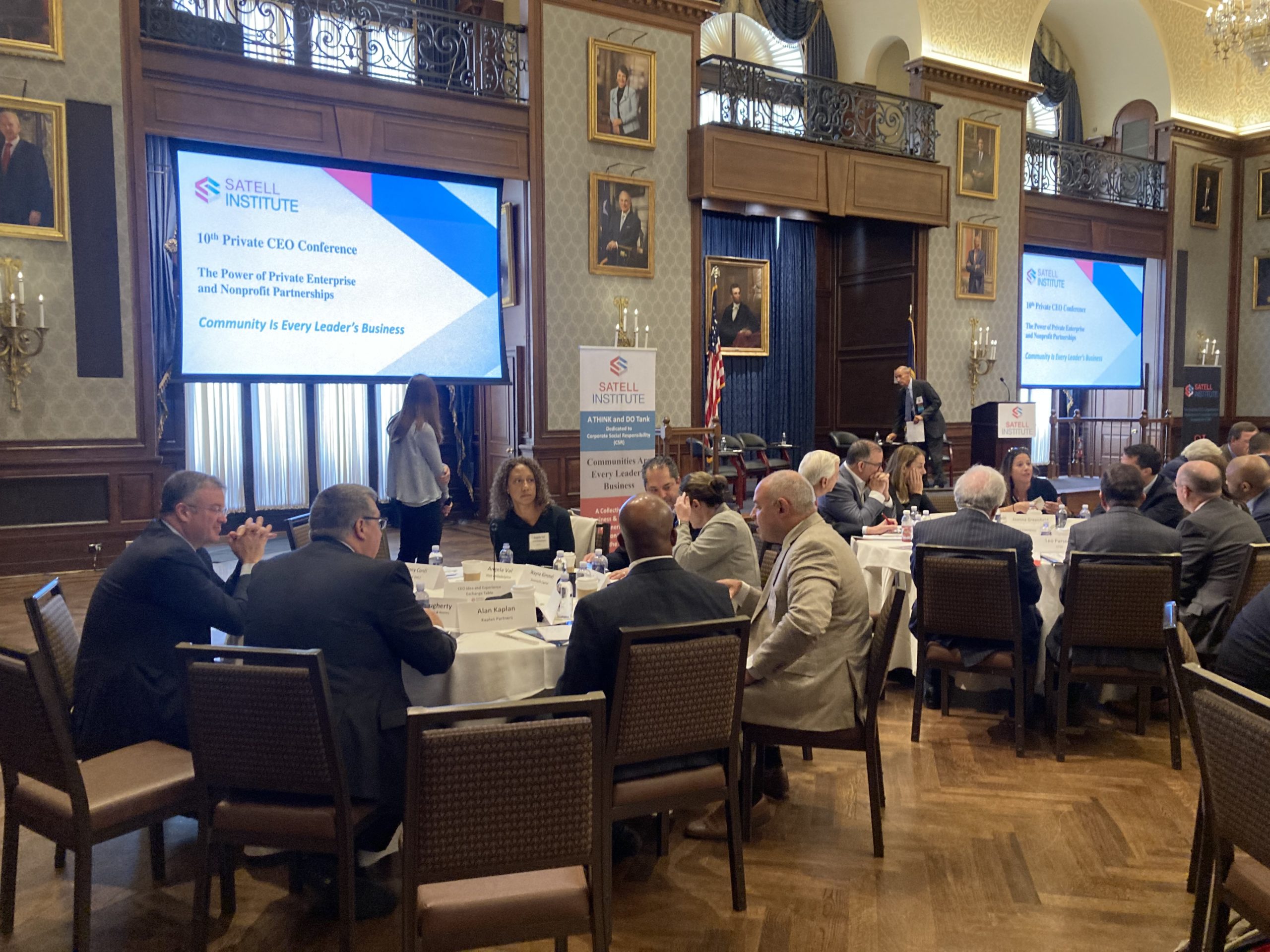When they engage in Corporate Social Responsibility, CEOs wield enormous clout. To help their businesses thrive. To empower nonprofits. To fundamentally improve their communities.
That was the overriding message of the Satell Institute’s Fall 2022 Private CEO Conference, held on October 6th at the Union League in Philadelphia (and also livestreamed). Attended by a record crowd of more than 325 leaders, the event—entitled “The Power of Private Enterprise and Nonprofit Partnerships”—provided SI members and their invited guests with a morning of compelling presentations, as well as SI’s hallmark CEO Idea and Experience Exchange on CSR.
“This conference brings together the leaders of free-enterprise organizations in our region, who produce 80 percent of all the jobs, which uniquely allow people to accept responsibility for their own economic lives,” SI founder and chairman Ed Satell said in opening remarks. “This is the event to celebrate both our free-enterprise system and the great leaders of nonprofits.”
Among the highlights of the event was a keynote address by Ginni Rometty, former chair and CEO of IBM. Rometty spoke powerfully about her tenure at IBM, noting that by thinking more broadly about the community, she transformed the company and better positioned it for growth.
Here are four key takeaways from Rometty’s remarks:
* Companies ensure long-term viability when they embrace all stakeholders.
Rometty noted that leaders shouldn’t think of Corporate Social Responsibility as a “program” they need to implement, but as something more elemental to their company’s existence. “I was taught that in the long term, if an organization is going to exist, it’s society that gives it license to exist, and society can revoke it,” she said. “And you only get that license when you do the right thing for employees, for customers, for partners, for your community, and for shareholders. It’s a virtuous circle.”
* Leaders need to think differently about their workforces.
Rometty shared two life events that shaped her thinking during her transformative tenure at IBM. When she was 16, her father left the family, leaving Rometty’s mother homeless and jobless with four children to raise. While her mother was eventually able to find work and get an education at a community college, the challenges she faced drove home a key point to Rometty: “Aptitude and access are two different things,” she said. “My mother was smart. This was not the issue. But she didn’t have access to many things that allowed her to succeed.”
Similarly, when Rometty became IBM chair, she noted that the company was struggling to find talent—in part because 95 percent of its jobs required a college degree. Not only was this bad for IBM, she believed, but the model was bad for the country, since more than six in 10 Americans don’t have four-year degrees. “The whole digital era is really cutting out huge swaths of society based on the fact that we have this false requirement that to get hired and do a good job, you have to have a college degree.”
Under Rometty’s leadership, IBM has instead adopted a skills-first culture, dropping the requirement for a college degree in 50 percent of its jobs while focusing even more intently on the skills required to do jobs well. This has given more people access to upwardly mobile, middle-class jobs. Even more important: it’s benefitted IBM, since those employees are more loyal, more retentive and more likely to seek out further education.
Companies do best, Rometty said, when they think about developing skills and people, not merely buying them.
* Companies contribute most when they give people jobs.
Since retiring from IBM, Rometty has focused on turning the “skills first” idea into a movement. In the wake of the George Floyd protests in 2020, she co-founded the One Ten Organization, whose mission over the next decade is to help companies hire, promote and advance one million Black individuals who don’t have four-year college degrees into family-supporting jobs. It’s the way corporations are best able to contribute to society: by giving people jobs.
“Removing systematic barriers in this country will allow people a better economic future,” she said. “And I think this is at the heart of a really healthy democracy as well: that people can say, I don’t need to be so polarized. I can actually see a better way forward for myself and my family through the dignity of a job and work.”
* To succeed, leaders must be authentic.
Rometty emphasized that she was only able to succeed in shifting IBM’s culture because she deeply believed in what she was doing. “I see many people who approach [CSR] as a checkbox thing they have to do; it’s a number,” she said. “But I always say, diversity’s a number, inclusion is a choice. And you only make choices when you authentically believe….I authentically believe that a more diverse workforce gives you better products and better outcomes: Employees are happier. Communities are better.”
The fall CEO conference also featured Satell Institute members giving compelling presentations about their experience with CSR. Speakers included Matt Aaron, president of the Special Olympics of Pennsylvania; Leslie Walker, executive director of the Sixers Youth Foundation; Joe Dougherty, chairman and CEO of Buchanan Ingersoll and Rooney; and Peter Frumkin, Ph.D, professor at the University of Pennsylvania and founding research director of the Satell Institute.
David DeStefano, chairman and CEO of Vertex, served as chair of the fall CEO conference.
SI CEO Paul Beideman provided an update on the Institute, noting that it’s on track for 30 percent growth in membership in 2022, including successful expansion in Pittsburgh, Central Pennsylvania and South Jersey. Up next are Washington D.C./Baltimore and New York City. “The key support for expansion comes from our current members and the introductions they provide to business and nonprofit leaders,” said Beideman.


